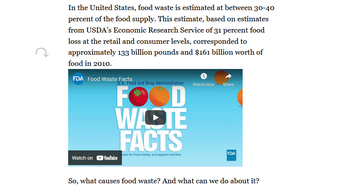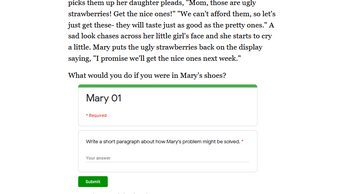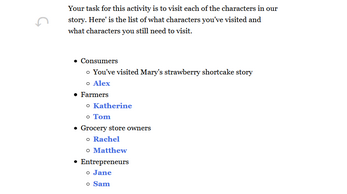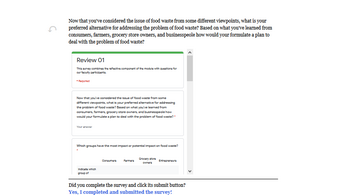Ugly food!
Food security: Case 01
An interactive case-based scenario about food waste.
These modules begin by introducing some sort of ill-structured problem. For this module, several groups of people involved with the issue were identified and two characters for each category were developed. Each character's story provides an alternative perspective on the issue of food waste. Three of the eight total character stories were developed and the rest will be completed later.
Players become involved with the problems each character faces and are asked to reflect and make decisions periodically throughout the module. Players are asked to generate alternative solutions, select preferred alternatives, and develop implementation plans.
Module design
This module's design is conceived as a problem-solving learning environment (PSLE) as described by Jonassen (2011) and uses multiple cases as alternative perspectives on the issue of food waste and security. PSLEs that use cases as alternative perspectives are based on cognitive flexibility theory (Spiro et al., 1988). According to (Spiro et al., 1991), the multidimensional and non-linear affordances of hypertext are ideal for representing cognitive flexibility theory's "constructivist approach to promoting complex conceptual understanding and adaptive knowledge use for transfer" (p. 28). It follows that digital tools specially designed to create interactive fiction, such as Twine software, an open-source software allied with the Interactive Fiction Technology Foundation (IFTF), are a good fit for educators and designers seeking to present cases as alternative perspectives within digital PSLEs.
All of the NIFA priority areas are populated with ill-structured problems (such as food security in the case of this module). The origins of problem-based learning (PBL) involve the use of ill-structured problems, represented as cases, within medical education (Barrows & Tamblyn, 1980). Teaching with case studies often involves some kind of facilitation of case discussion around a given issue. The interactive, hypertext-based scenarios in these modules can be loosely based upon a decision-making model recommended by Maufette-Leenders et al (1997), as was done with the current module on the issue of food waste.
The kinds of pedagogical models can serve as helpful guidelines when training participants to design and develop interactive cases, scenarios, and simulations involving ill-structured problems that exist within the critically important areas of food, climate, energy, and health.
Design tools
These modules are developed with technological tools that do not have steep learning curves. Interactive fiction authoring software such as Twine provides an easy entrance into the technical skills involved with building PSLEs that use cases, scenarios, and simulations. Commonly used, mainstream embeddable web objects such as Google forms and YouTube videos were used to embed additional interactivity into the modules. In addition to facilitating learner reflection, the Google Form surveys allow teachers to collect, visualize, and share participant data using spreadsheets and charts.
References
Barrows, H. S., & Tamblyn, R. M. (1980). Problem-based learning: An approach to medical education. Springer.
Jonassen, D. H. (2011). Learning to solve problems: A handbook for designing problem-solving learning environments. Routledge.
Mauffette-Leenders, L. A., Erskine, J. A., & Leenders, M. R. (1997). Learning with cases. London, Ont: Richard Ivey School of Business.
Spiro, R. J., Coulson, R. L., Feltovich, P. J., & Anderson, D. K. (1988). Cognitive flexibility theory: Advanced knowledge acquisition in ill-structured domains (Technical Report No. 441). Southern Illinois University School of Medicine.
Spiro, R. J., Feltovich, P. J., Feltovich, P. L., Jacobson, M. J., & Coulson, R. L. (1991). Cognitive Flexibility, Constructivism, and Hypertext: Random Access Instruction for Advanced Knowledge Acquisition in Ill-Structured Domains. Educational Technology, 31(5), 24–33.
| Status | In development |
| Platforms | HTML5 |
| Author | calla |
| Genre | Simulation, Educational, Interactive Fiction |
| Made with | Twine |
| Tags | case-based-scenario |
| Average session | About a half-hour |
| Languages | English |
| Inputs | Keyboard |
| Accessibility | High-contrast, One button |
Development log
- updated topic - food wasteFeb 28, 2021
- HEC simulation design documentFeb 03, 2021






Leave a comment
Log in with itch.io to leave a comment.